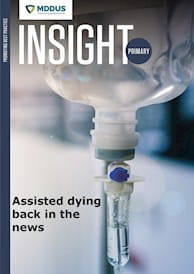These cases are based on actual calls made to MDDUS advisers and are published here to highlight common challenges within general practice. Details have been changed to maintain confidentiality.
Pension form
Q. A patient at our practice is seeking to claim her state pension before the age of 55 due to mental health issues that have forced her to give up work. She has requested that her GP complete a pension form in support of her claim but he is reluctant to do so without specialist input.
Doctors should act in accordance with the principles in the GMC’s Good medical practice guidance. This includes recognising and working within the limits of their competence (paragraph 14), and that a doctor must be honest and trustworthy when writing reports or completing or signing forms, and ensure that they are not false or misleading (paragraph 71). The GMC’s supplementary guidance on Confidentiality: disclosing information for employment, insurance and similar purposes also states that a doctor must restrict report writing to areas in which they have direct experience or relevant knowledge (paragraph 7).
Considering this guidance it is important that your GP ensures details included in any form or report are accurate before signing. It may be suitable for the GP to contact the patient’s secondary care mental health provider for more information before completing the form. Should the GP feel unable to complete the form, an explanation should be provided to the patient, who can then be signposted to other services for help (e.g. an occupational health provider). Any decisions made should be documented and, if not relevant to ongoing patient care, should be stored in a secure location separate to the patient’s notes.
Notice period
Q. Yesterday one of our recently employed practice staff was signed off work for four weeks by her GP. She has today handed in her resignation. We have checked her contract and her notice period is four weeks. Are we obliged only to pay her up until the end of her notice period?
Yes – the fit note covers her for her notice period so you would still pay the four weeks plus any outstanding annual leave she may have accrued but not taken during her short time with the practice. You should confirm in writing her end date.
Sign language interpreter
Q. We have a new patient at the practice who is deaf and has requested a British Sign Language (BSL) interpreter. The cost of arranging this, plus the longer appointment time, may be considerable. Are we obliged to provide this?
Under the Equality Act 2010, healthcare providers are obliged to make “reasonable adjustments” for people with a disability. The General Medical Council’s Good medical practice (paragraph 32) also states “You must give patients the information they want or need to know in a way they can understand. You should make sure that arrangements are made, wherever possible, to meet patients’ language and communication needs.”
In this case, the practice would have to assess whether arranging and paying for a BSL interpreter is “reasonable”. Note that it is unlawful for a healthcare provider to ask a deaf person to pay for a sign language interpreter that they arrange (section 20(7) of the Equality Act 2010). Some NHS providers may offer financial assistance with such costs. Be aware that refusing to provide this service may leave you open to legal challenge. It may be helpful to communicate with the patient in writing about what reasonable adjustments and support they require in order to understand and make informed decisions about their care and treatment options. Read more in the Care Quality Commission’s GP mythbusters guidance on making information accessible and reasonable adjustments for disabled people.
Employing a medical student
Q. We plan to employ a fourth-year medical student at the practice to help mainly with admin tasks, but also some clinical duties such as checking BPs, urine samples and bloods. Would this be okay?
For both administrative work or any clinical duties, it would be up to the practice clinicians to be satisfied that the student is appropriately trained, competent and supervised to do such work, in accordance with the GMC’s delegation guidance (paragraph 4). A contract of employment would be necessary and the student should also inform their own MDO of any roles they are undertaking.
Complex capacity assessments
Q. We are a practice based in Scotland. We sometimes get requests to carry out capacity assessments, for example for guardianship applications. In many cases the patient will have advanced dementia and the assessment is requested quite late so it’s relatively easy to come to a decision. But we do get problematic cases and these often involve younger patients. Is it okay to be selective in accepting requests (i.e. can we decline the riskier ones) or does this risk a charge of discrimination based on disability?
Assessing capacity for healthcare decisions is a core skill for all doctors. However some requests for assessments may be more difficult, either because of clinical complexity or because the purpose is unrelated to healthcare. It is important before agreeing to a request that you understand the assessment that needs to be carried out and that it is within your competence to undertake it. In more complex cases, that are outside of your competence, it would be appropriate to refuse and perhaps suggest the assessment is undertaken by a specialist. Having set out in the records your justification for not performing an assessment on a specific case, it would be unlikely that you would be considered to be discriminating against a patient.
Prescribing for a patient abroad
Q. A patient has been living overseas for more than four months and is still requesting medication from the practice. Are we correct in informing her that we can no longer provide repeat prescriptions for her ongoing treatment?
Yes. We would strongly advise members not to consult with or prescribe medication to a patient who is overseas. MDDUS is a UK-wide indemnity organisation and provides assistance to members for actions raised against them only within the UK and does not provide indemnity for medical treatment where the patient is located outside the UK. Members would be unlikely to be represented if action was taken against them in another country where harm had arisen as a result of their provision of medical treatment or advice.
The GMC also provides relevant guidance in Good practice in prescribing and managing medicines and devices and ethical guidance on high level principles in remote prescribing. It states that UK-based healthcare professionals prescribing to a patient overseas would be expected to consider how they or local healthcare professionals will monitor the patient’s condition. They would also need to take account of any legal restrictions on prescribing or the supply of particular medicines, and any differences in licensing or accepted clinical use in the destination country.
The patient should be encouraged to see a local medical practitioner. The practice could offer to liaise with a local practice to provide an update of her medical information if this would be of assistance (on the basis that the patient would be responsible for costs associated with any needed translation).
Unwelcome advance
Q. I’m a trainee GP and have been sent a birthday card from a patient at my current practice suggesting that we meet for a drink. How should I deal with this?
We would suggest that you show the card to a senior partner or your supervisor so that a response can be sent from the practice. The letter should advise the patient that such an approach is unacceptable and it is imperative that the patient adheres to the professional doctor-patient relationship (see paragraph 5 of GMC guidance on Maintaining a professional boundary between you and your patient). The practice should also consider ensuring that future consultations are undertaken by a different GP and warning the patient that any recurrence of unacceptable contact may result in his removal from the practice list.
This page was correct at the time of publication. Any guidance is intended as general guidance for members only. If you are a member and need specific advice relating to your own circumstances, please contact one of our advisers.
Read more from this issue of Insight Primary

Save this article
Save this article to a list of favourite articles which members can access in their account.
Save to library

